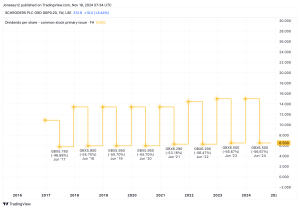Share this page:
Until now, we’ve had roughly 40 years of low inflation.
Cash seemed safe. Bonds were a sure thing. Tech stocks roared higher, higher and higher.
And who cares if they had no earnings?
You were paying for future profits. Anyway, with rock-bottom interest rates, you weren’t exactly missing out elsewhere. Only losers accepted 0.1% at the bank. “Do you really want to be a loser?”
That has been the story now for many, many years.
Investors are overwhelmingly positioned in the types of stocks to match.
But what happens when the tide turns – as it seems to be doing now?
Are all stocks safe during inflation?
The simple answer is no.
First you have the obvious problem of belt tightening.
In 2021, inflation rose 5.1%. The Bank of England expects a 7% surge by spring. And don’t even get me started on energy prices. The average household is expected to pay £1,896 more!
Suppose Mr. and Mrs. Jones MUST pay that bill or starve.
Well, it stands to reason, they now have £1,896 less to spend elsewhere.
Businesses selling non-essentials and luxury goods are typically the first to get hit. Especially if they’re not diversified across different markets.
Second, stock values are usually based on future earnings.
Remember those money-losing tech stocks I mentioned? They don’t seem nearly as attractive now, do they? You’re waiting and waiting for them to earn cash in the future, when that cash will be worth a lot less.
When inflation rips, you can’t afford to wait.
You need the earnings now.
Finally, there’s the problem of rising interest rates.
This typically happens during inflation, because bond holders must be compensated for the loss of currency value.
If you could earn, say, 5% holding a government bond, why hold a stock paying less?
Stocks must offer greater rewards than low-yield bonds, because the risk is that much higher. If they don’t, expect share prices to fall.
So, where should you put your savings?
If cash is losing value, bond prices are cratering and shares risk getting hammered, is anywhere safe?
As it happens…
3 types of shares tend to soar during inflation
These are the sectors I would focus on first.
No, I’m not saying these will make you an overnight millionaire.
Nor am I saying there won’t be bumps in the road.
However, if inflation does stick around – as I personally believe – I would expect them to do well over the long term.
These include:
1. Consumer staple stocks
Of course, it’s easy to give up that luxury holiday or new car.
However, some things you simply cannot do without.
Consumer staple companies – producing food, toiletries, cleaning products etc – offer more protection, and there are a good number in the FTSE 100. By selling essentials, they can afford to raise prices without losing customers.
This helps cover their own rising costs.
2. Commodity stocks
Most people think of inflation as “prices rising.”
Actually, it’s more accurate to call it “pounds falling.”
When you see inflation this way, you instantly appreciate the value of physical, tangible assets.
And what could be more tangible than the raw ingredients we use every day?
Oil…Copper…Fertiliser…Silver…natural gas…livestock…grains…
Unlike cash, commodities have intrinsic value.
That’s why their prices tend to rise when the value of cash falls.
It’s very good news for companies producing these vital commodities.
Their earnings can be expected to rise, without any new innovations or investments.
3. Value stocks
The simplest way to judge a stock is to look at its price-to-earnings ratio.
How much is your business earning relative to the price you pay?
Value stocks are priced low relative to the market’s average.
Since you’re paying less for today’s earnings today, you’re not waiting so long for your investment to see a return. And value stocks often pay healthy dividends. This cash can be reinvested, or spent elsewhere, before its value falls.
Of course, this isn’t a foolproof blueprint. You must choose high-quality companies within those sectors within your stock picks.
Was this article helpful?
YesNo
About the author
An investor for 10 years, I’ve learned most lessons the hard way. Now I’m a financial copywriter with better experience!
Share this page:
Some offers on The Motley Fool UK site are from our partners — it’s how we make money and keep this site going. But does that impact our ratings? Nope. Our commitment is to you. If a product isn’t any good, our rating will reflect that, or we won’t list it at all. Also, while we aim to feature the best products available, we do not review every product on the market. Learn more here. The statements above are The Motley Fool’s alone and have not been provided or endorsed by bank advertisers. John Mackey, CEO of Whole Foods Market, an Amazon subsidiary, is a member of The Motley Fool’s board of directors. The Motley Fool UK has recommended Barclays, Hargreaves Lansdown, HSBC Holdings, Lloyds Banking Group, Mastercard, and Tesco.
This post was originally published on Motley Fool







